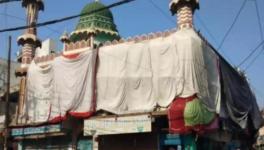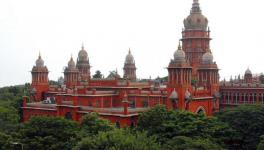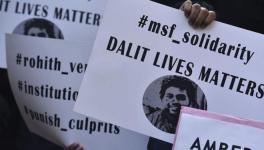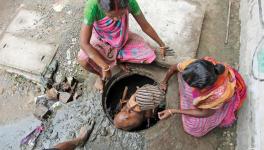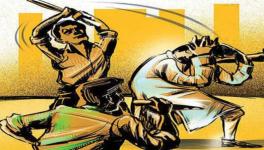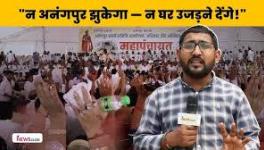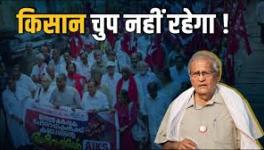Rajasthan: Dalit Youth Assert Right to Dignity in Wedding Processions

Heavy police protection was deployed during the wedding procession of the groom, Prakash Jangid (Photos sourced by Kshitiz Gaur, 101Reporters)
Ajmer, Rajasthan: In December of last year, it was decided that Lokesh Bakoliya (27) and Aruna Khorwal (25) would get married in January. The ceremony was set to take place in their home in Lavera village of Srinagar block in Rajasthan’s Ajmer district, and the preparations started in full swing. Bakoliya, a Master's graduate in Hindi from Government College Ajmer, planned to reach the wedding venue on horseback, as is the tradition in most Hindu weddings.
For Bakoliya–a member of the Dalit community–riding a horse was more than just a ritual.
It was an act of defiance against the centuries-old caste discrimination that denied his community such a simple privilege. The idea that Bakoliya would ride a horse during his baraat or wedding procession was met with resistance from the upper caste community. Even some members of his own community feared backlash for breaking caste norms.
Initially, Bakoliya’s father-in-law, Narayan Khorwal, was also against the idea. It was the bride who insisted that they continue with the celebration as planned and that her father go to the police for protection.
Ramesh Bansal, Secretary of Manav Vikas Avam Adhikar Kendra Sanstha, a non-government organisation working for protecting the rights of the Dalit community, said that, unsurprisingly, certain members of the upper caste communities threatened Narayan against allowing the groom to ride a horse to his wedding.
In Lavera, a village of 3,000, only four to five families belong to the Dalit community, making them vulnerable to caste-based pressures. “Worried, the Dalit community asked Narayan to continue following their village’s tradition wherein a Dalit groom arrives at the wedding venue on foot,” Bansal added.
According to Bansal, the strongmen descend as a mob to reinforce the caste discriminatory practices in the village. Many also carry arms and other weapons.
This is not unique to Ajmer–similar tensions exist across pockets of Rajasthan and the rest of the country.
In February, upper-caste men attacked a Dalit groom for riding a horse for his wedding in Rajasthan’s Jalore district. They beat him up, pulled him off the horse, and even took the horse away. In November 2021, a Dalit groom’s baraat was pelted with stones despite heavy police presence in Kerodi village in Jaipur Rural district. In 2022 in Nagaur, upper caste members halted a wedding procession and pulled down a groom from his horse.
Police intervention
Bansal told 101Reporters that with improvement in the financial and educational conditions of the Dalit community, many educated youths are actively challenging the discriminatory practices.
“In Bakoliya’s case we approached the police and they called a meeting at Hatai with the sarpanch, heads of other castes, Narayan and the groom's father Mohan Bakoliya,” he said.
During the meeting, the upper caste members decreed that Bakoliya’s baraat be not allowed to enter the village and instead take an outer route. When they refused to reconsider, Bakoliya approached Ajmer Superintendent of Police Vandita Rana. Deadlock prevailed after another round of meetings, and the police decided to provide protection to the groom and the two families during the festivities to prevent any untoward incident.

Heavy police protection was deployed during the wedding procession of the groom, Prakash Jangid (Photos sourced by Kshitiz Gaur, 101Reporters)
The bride, Khorwal, recalls, “I wanted to be sure that there would be no dispute on my wedding day. I asked my father to ask the police for protection in writing.” On January 21, Bakoliya’s baraat moved through the village in the presence of 400 Rajasthan police personnel, and the wedding concluded peacefully.
Long road ahead
According to a Rajasthan police personnel, as recently as 10 years ago, the older generation, though dissatisfied, would not raise their voice against the age-old oppressive practices. “But now the Dalit grooms want to exercise their right and seek the help of police,” said Manisha Kumari, Additional Public Prosecutor in Ajmer's District and Sessions court.
In December 2024, in Nagaur district—just three hours from Ajmer—Dalit groom Prakash Jangid too sought police protection to ensure he could ride a horse during his wedding. On December 6, his baraat proceeded amid heavy police presence in Gudha Jodha village.
“I was scared of chaos unfolding... I thought even my relatives would turn against me, but when I saw my son riding a horse, I felt a sense of relief,” Jangid’s father, Kachrulal Jangid told 101Reporters.
Similarly, another matter is reported from the Banaskantha district of Gujarat on February 7 this year. In Gadalwada village, a Dalit groom wrote to the Superintendent of Police on January 22, expressing concern about the potential disruptions during his wedding and saying that some members of the upper caste community have issued threats against him. In response, the police deployed around 150 personnel to ensure the baraat’s security.
To support the groom and stand against caste-based discrimination, politician and activist Jignesh Mevani also joined the procession. Speaking to reporters, Mevani said, “Banaskantha remains a socially-backward region with a large population of Dalits. That’s why education and equal rights are crucial.”
Former Station House Officer of Ajmer’s Srinagar police station, Harish Choudhary said, “In such sensitive cases, we call a meeting to solve the matter with public consensus… In the case of a deadlock, we offer protection to the groom.”
SP Rana agreed, saying, “Police are with the law. Police act fast whenever any incident of discrimination is reported and take appropriate action.”
Bansal, however, added that there is still a long way to go. Often, the threats dissipate after the wedding, but the sense of fear among the community doesn't.
Sensing that his family and community were still ill at ease, Kachrulal approached the collector after the wedding to request that the police be at hand if any escalation was to happen. The beat officer at the police station made rounds of the village for several days after that.
Kshitiz Gaur is a freelance journalist and a member of 101Reporters, a pan-India network of grassroots reporters.)
Get the latest reports & analysis with people's perspective on Protests, movements & deep analytical videos, discussions of the current affairs in your Telegram app. Subscribe to NewsClick's Telegram channel & get Real-Time updates on stories, as they get published on our website.









